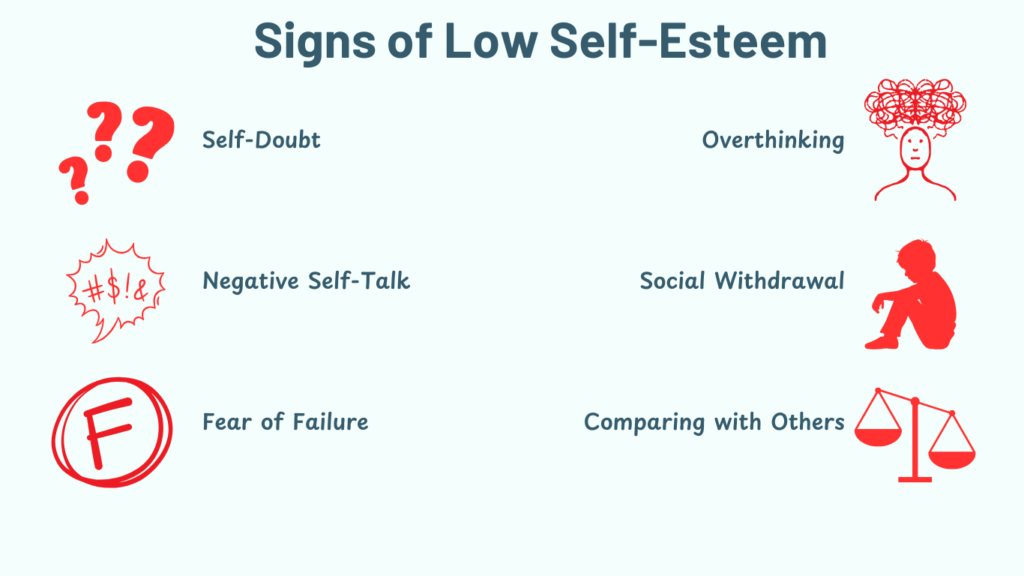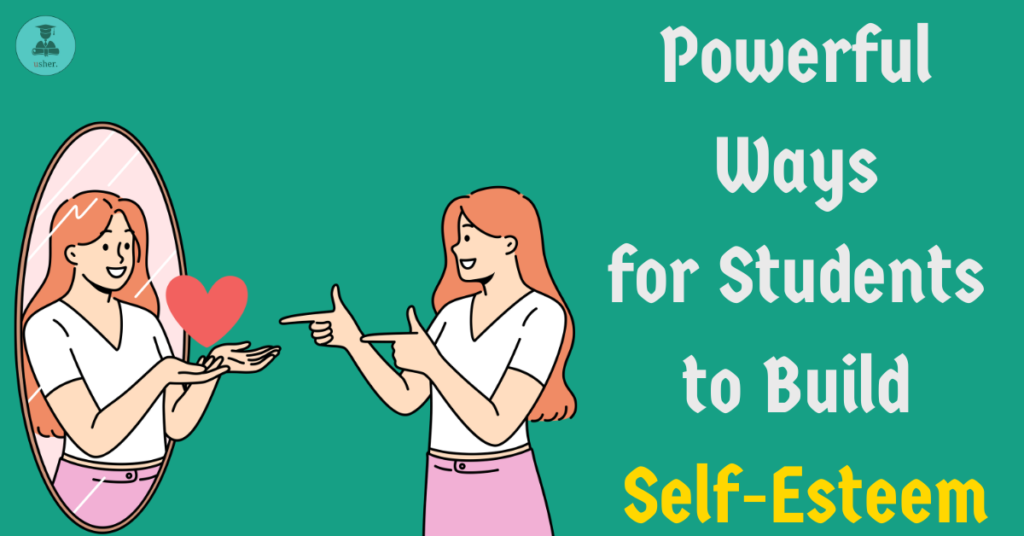You are what you believe yourself to be.
Paulo Coelho
This statement by Paulo Coelho emphasizes the importance of self-perception in shaping one’s identity and confidence.
It discusses a key part of a person that influences what they do and the choices they make.
“The Self Esteem”
In this blog, we will explore the concept of self-esteem, its importance, the factors that influence it, and practical strategies to enhance it.
What is Self-Esteem?
Self-esteem is all about how we see and appreciate ourselves.
Self-esteem refers to the overall sense of personal value or self-worth. It is how people view themselves and their abilities, which can vary depending on their experiences, interpersonal relationships, and environment.
Healthy self-esteem enables students to navigate challenges and approach life with confidence.
Different Levels of Self-Esteem (High vs. Low)
- High Self-Esteem: Students with high self-esteem generally possess a positive self-image, feel competent in their abilities, and are more willing to take on new challenges. They view failures as opportunities for growth rather than as reflections of their worth.
- Low Self-Esteem: Conversely, students with low self-esteem often struggle with self-doubt, negative self-talk, and a fear of failure. This can hinder their academic performance and limit their willingness to engage in social or extracurricular activities.

Why Self-Esteem Matters for Students
Self-esteem significantly influences how students make decisions.
Students with high self-esteem tend to trust their judgment, take risks, and pursue their goals with determination.
They are more likely to:
- Set ambitious goals and work diligently to achieve them.
- Overcome challenges and problems by adopting a growth mindset.
- Approach failures as learning experiences, building resilience.
Having healthy self-esteem really goes hand in hand with good mental health. Students who have a good sense of self-esteem tend to feel less anxious and depressed, and they’re generally better at managing stress.
They usually get more involved in social interactions, which helps build stronger support networks and boosts overall well-being.
Therefore, self-esteem really matters in a student’s life. It has a big impact on how they do in school and grow as individuals.
It shapes how they see themselves, which in turn affects their motivation, resilience, and overall mental well-being.
Factors Influencing Self-Esteem in Students
– Peer Pressure and Comparison
In today’s digital age, peer pressure can have a significant impact on students’ self-esteem. Social media platforms often create unrealistic standards for success, beauty, and popularity. This constant comparison can lead to feelings of inadequacy and low self-worth.
– Academic Performance and Teacher Feedback
Academic success can greatly influence a student’s self-esteem. Positive feedback from teachers can boost a student’s confidence, while consistent negative feedback may lead to feelings of failure and self-doubt.
– Family Support and External Validation
The role of family in shaping self-esteem cannot be overstated. Supportive and nurturing family environments promote healthy self-esteem. In contrast, critical or neglectful family dynamics can lead to low self-esteem.
Building Healthy Self-Esteem
Building self esteem requires hard work and dedication. Here are a few strategies through which you can build healthy self-esteem.
- Practicing self-care – Taking care of yourself and practicing mindfulness can really help reduce anxiety that comes from low self-esteem. This can really help you focus on your strengths and what you’ve achieved, instead of getting caught up in what you think are your weaknesses.
- Setting achievable goals – Always aim to be realistic. If you’ve got a lot on your plate with big tasks or goals, try breaking them down into smaller, more manageable ones. Just take it one step at a time and you’ll get there!
- Surrounding yourself with positive influences – People usually start to resemble the ones they hang out with the most. So, make sure to hang out with folks who care about you and support your growth.
- Challenging negative self-talk – It’s important to recognize when you’re being too hard on yourself and replace those negative thoughts with positive affirmations. If you take the time to be kind and compassionate to yourself, you’ll likely see a boost in your mindset and overall well-being.
Just keep in mind that you’re your own biggest fan!
Seeking external validation from supportive friends and mentors can also help reinforce feelings of self-worth.
Importance of Recognizing Accomplishments and Learning from Failures
It’s important for students to recognize their achievements, even the little ones, and to see failures as chances to grow. This viewpoint really helps build resilience and boosts self-esteem in a positive way.
Difference Between Self-Esteem vs. Self-Confidence
Self-esteem is all about how we see ourselves and our value, whereas self-confidence focuses on trusting in our abilities and skills.
For example, a student may have high self-esteem but lack confidence in public speaking.
It’s important to cultivate both in order to have a strong sense of self-worth and belief in oneself.
Why Both Are Necessary for a Student’s Success
Both self-esteem and self-confidence are essential for a student’s success.
High self-esteem encourages students to pursue challenges, while self-confidence enables them to excel in specific tasks.
Together, they create a solid foundation for personal and academic achievement.
Ways to Develop Both in Tandem
- Encourage Skill Development: Help students develop specific skills in areas they are passionate about, which can boost both their self-confidence and self-esteem.
- Promote a Growth Mindset: Teaching students to embrace challenges and learn from criticism fosters both self-esteem and self-confidence.
Practical Tips to Improve Self-Esteem
As you have seen , self-esteem really plays a crucial role in both personal and academic success, especially when you’re a student. It influences how students see themselves, approach challenges, and engage with the world around them.
Building healthy self-esteem is super important for students. It really influences their motivation, resilience, and overall well-being.
Here are some practical, actionable tips for students to build and maintain a positive self-image.
A. Build a Supportive Environment
Creating a positive environment plays a critical role in building self-esteem.
A supportive environment provides students with a safe space where they can be themselves, make mistakes, and learn without fear of judgment.
- Seek Positive Influences: Surround yourself with friends, family, and mentors who encourage and uplift you. Having people who believe in your abilities and remind you of your strengths can significantly boost your self-esteem.
- Limit Time with Negative Influences: If possible, reduce interactions with those who may bring you down or engage in toxic behaviors. Recognize that it’s okay to distance yourself from situations and people who negatively affect your well-being.
B. Engage in Activities That Encourage Growth and Confidence
Taking part in activities that push you to learn and grow helps you discover new strengths, overcome fears, and gain confidence.
Whether it’s joining a sports team, an art club, or a volunteer organization, engaging in purposeful activities can be transformative.
- Pursue Your Interests: Focus on activities that genuinely interest you, as they provide a sense of fulfillment and purpose. Doing things you enjoy can enhance your self-worth, making you feel capable and valued.
- Challenge Yourself in Healthy Ways: Stepping out of your comfort zone in a supportive environment helps you learn more about your strengths and abilities. Small successes in these areas can build your confidence and encourage you to take on bigger challenges.
C. Learn to Manage Negative Self-Talk
Negative self-talk is a common obstacle to healthy self-esteem.
When students constantly criticize themselves, they are more likely to experience self-doubt and feelings of inadequacy.
Learning to recognize and replace negative self-talk is a powerful skill for improving self-esteem.
- Identify Negative Thoughts: Pay attention to your inner dialogue, especially when you’re feeling down or anxious. Notice if you’re engaging in negative self-talk, like “I’m not good enough” or “I always mess things up.”
- Challenge and Replace Negative Thoughts: Once you recognize negative thoughts, challenge their validity. Ask yourself if they are based on facts or assumptions. Replace negative thoughts with positive affirmations like “I am capable,” or “I’m doing my best, and that’s enough.”
D. Avoid Comparing Yourself to Others
In a world of constant social media updates and high academic expectations, it’s easy to fall into the trap of comparison.
However, constantly measuring yourself against others can damage your self-esteem, making you feel as though you’re not good enough.
- Focus on Your Own Journey: Remind yourself that everyone’s path is unique. Instead of comparing your progress to someone else’s, reflect on your own growth. Celebrate your achievements, no matter how small, and take pride in how far you’ve come.
- Limit Social Media Time: Social media often creates unrealistic portrayals of success, beauty, and happiness. Try to limit your time on these platforms, especially if you find yourself comparing your life to those of others online.
E. Recognize and Celebrate Your Accomplishments
Celebrating your achievements, no matter how small, reinforces the belief that you are capable and valuable.
Taking time to acknowledge your progress reminds you of your strengths and encourages a positive self-image.
- Keep a Success Journal: Write down your accomplishments, big or small. It could be anything from completing a challenging assignment to helping a friend. Reviewing these entries on tough days can remind you of your resilience and abilities.
- Reward Yourself: Don’t be afraid to treat yourself after achieving a goal. It doesn’t have to be extravagant—a simple reward like watching your favorite show or spending time with friends can serve as a reminder that hard work deserves recognition.
F. Set Realistic Goals and Embrace Small Steps
Setting realistic, achievable goals gives you a sense of direction and purpose.
Breaking down large goals into smaller, manageable steps allows you to see progress, which can be a major boost to your self-esteem.
- Set Specific, Measurable Goals: Instead of vague goals like “do better in school,” set clear goals like “improve my math grade by 5% this semester.” Specific goals are easier to track and more satisfying to achieve.
- Focus on Progress, Not Perfection: Remember, self-improvement is a journey. Acknowledge that setbacks are part of the process and focus on the progress you’re making rather than striving for perfection.
Conclusion
Building strong self-esteem during school years really pays off in the long run. When students have healthy self-esteem, they’re more likely to do well in school, build solid relationships, and keep their mental health in check. When students take small steps to improve themselves, they can really boost their self-worth and make their lives a lot better.




